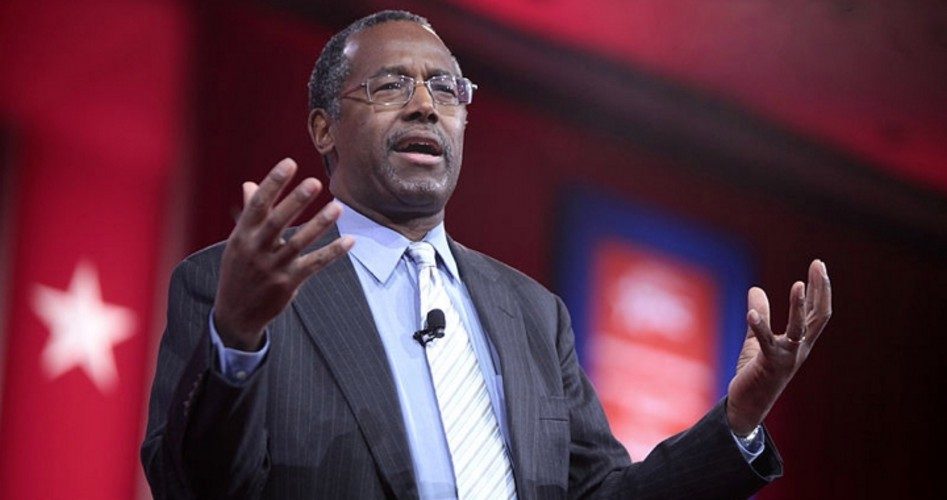
Republican presidential candidate Ben Carson (shown) answered “probably” to the question of whether the federal government should increase the minimum wage. The retired neurosurgeon has staked out a position that is at odds with the view that the free market — not government — should decide wages and prices.
In an interview with John Harwood of CNBC, Carson appeared to favor a higher minimum wage as a way to encourage those who draw government benefits to join the work force. “In several states you can get as much or more on government assistance as you can by working a minimm wage job,” said Carson, adding that he could not “necessarily blame people” for taking the attitude of simply drawing government assistance rather than working. “I can stay home and I can make this money, or I can go and work this little chicken job that doesn’t have many benefits,” is how Carson summed up the attitude of many beneficiaries of government assistance.
“However, recognize that if you go and take that chicken job, you gain skills, relationships, the possibility of moving up the ladder,” Carson argued. “So a year or two or five down the road, you’re no longer in that position. This is what people have forgotten.”
Carson’s reasoning seems clear. If the government were to raise the minimum wage, then the higher wage would make a job more desirable than the government “assistance” the person is presently receiving. Following through on his line of thought, if the government forced a business owner to pay his workers higher wages, then the taxpayer would not have to pay for their government benefits, and the person would become a productive member of society, instead of a drain on others in society who must pay taxes to fund those government benefits.
While this may seem logical, Carson’s scenario neglects to mention the negative consequences of the minimum wage. First, if the government should be able to set a minimum wage, why not a maximum wage? After all, why should neurosurgeons make more than a bus boy in a restaurant? In a free enterprise situation, the supply of those who can perform highly techical surgeries is quite limited. The supply of those who can bus tables, on the other hand, is quite high. The argument usually made by advocates of raising the minimum wage is that those receiving the present minimum wage cannot support a family on it. Under this reasoning, since Carson received far more as a neurosurgeon than what was necessary for him to make a living, then the government should have capped his wage.
Why does a business owner hire anyone? The answer should be obvious. He believes he can make more money by adding that additional employee than by not. In a growing and strong economy, the minimum wage usually becomes irrelevant. This is because more businesses are in need of more employees to care of the increased number of customers, making them pay a higher wage for those additional employees.
In an economic downturn, however, the minimum wage forces the business owner to make some difficult decisions. While he may need an additional worker, with business activity down, he may simply not be able to afford another employee. Because of the minimum wage, the business owner often decides he can make more money by laying off one employee. After all, the owner opens up a business to make money for his own family, not to give someone a job. It should also be noted that a person takes a job for his own family’s benefit as well, not to help the business owner make more money.
As Adam Smith observed many years ago in his famous book Wealth of Nations, the butcher does not prepare us our supper for our benefit, but his own. However, the only way the butcher can benefit himself is by preparing us our supper.
The cold, hard reality is that if the minimum wage is higher than the market price for that worker, then the business owner has limited options. He can, of course, raise his prices to pay for the additional worker; but in a stagnant economy, this may not be possible. Raising the price of the product might actually lead to even fewer customers, and reduced income for the business. If the business owner is unable to get his customers to pay the higher wage through higher prices for the product, then he must resort to cutting staff. Whereas before, the business may have operated witth seven workers, now it might have to cut back to six, or even five.
Another tactic used by business owners who are looking for ways to reduce their costs of doing business (and labor costs are usually the most expensive single item) is to experiment with some technology. After all, if you have a machine to take orders, you don’t have to worry about it calling in sick (or just not showing up). If a machine is cheaper than a human being would be after an increase in the minimum wage, then a business owner who must put his own family first could very well opt to cut staff.
While these basic economic principles are no doubt not taught in medical school, there are multitudes of physicians who have demonstrated their understanding of liberty and free market principles. Former U.S. Representative Dr. Ron Paul and now-deceased former U.S. Representative Dr. Larry McDonald are just two examples who come to mind.
Carson’s scenario that a person may opt to take a job rather than continue to simply draw government benefits no doubt could happen. As the great French philosopher Frederic Bastiat said, however, that is what is seen. Not seen are those employees who are willing to work for a lower wage, but cannot get a job because the minimum wage has priced them out of a job. It is also not seen when the minimum wage actually forces a business owner to close. Perhaps the owner would have taken a chance on a low-skilled, inexperienced person at a lower wage, but would not take that chance at the higher wage. All this is not seen.
Senator Bernie Sanders of Vermont, an open socialist, favors raising the minimum wage to $15 an hour. That should really get some fellow off the couch to take a job! But, we must ask Sanders (running for president on the Democratic ticket) and even Carson a pertinent question: If $10 an hour is good, and $15 an hour is better, why not just make it $100 an hour? Ludicrous? Of course. But once one accepts the premise that it is the proper role of government to set wages at all, why not?
The truth is, wise men have always realized that in a free society, wages and prices should be set by the free market, not by government.
Photo of Ben Carson: Gage Skidmore



